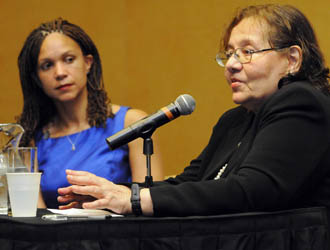Civil rights leader Diane Nash speaks on campus
Though history often focuses on iconic figures, it takes many voices to make a movement. Diane Nash, one of the most noted women leaders of the mid-century civil rights movement, was welcomed by a standing-room-only crowd of more than 300 people as she spoke with Tulane professor Melissa Harris-Perry on Wednesday (April 17).

Tulane political science professor Melissa Harris-Perry, left, leads a discussion with civil rights leader Diane Nash in the Kendall Cram Lecture Hall in the Lavin-Bernick Center. (Photo by Cheryl Gerber)
She encouraged the students in the audience to harness their energy to support social change while respecting the wisdom and experience of those in the community. “All of us as citizens are very capable of changing the world.”
A Chicago native who had never experienced segregation in public accommodations before moving to the South, Nash's involvement in the nonviolent movement began in 1959 while she was a student at Fisk University. In 1960 she became chair of the student sit-in movement in Nashville, Tenn. the first southern city to desegregate its lunch counters as well as one of the founding students of the Student Non-violent Coordinating Committee. In 1961 she coordinated the Freedom Ride from Birmingham, Ala., to Jackson, Miss.
Her many arrests for her civil rights activities culminated in Nash being imprisoned for 30 days in 1961, while she was pregnant with her first child. Undeterred, she went on to join a national committee, to which she was appointed by President John F. Kennedy, which promoted passage of the Civil Rights Act of 1964.
Nash's visit was co-sponsored by the Anna Julia Cooper Project, the Institute for Women and Ethnic Studies and the Newcomb College Institute.
Aidan Smith is external affairs officer for the Newcomb College Institute.
